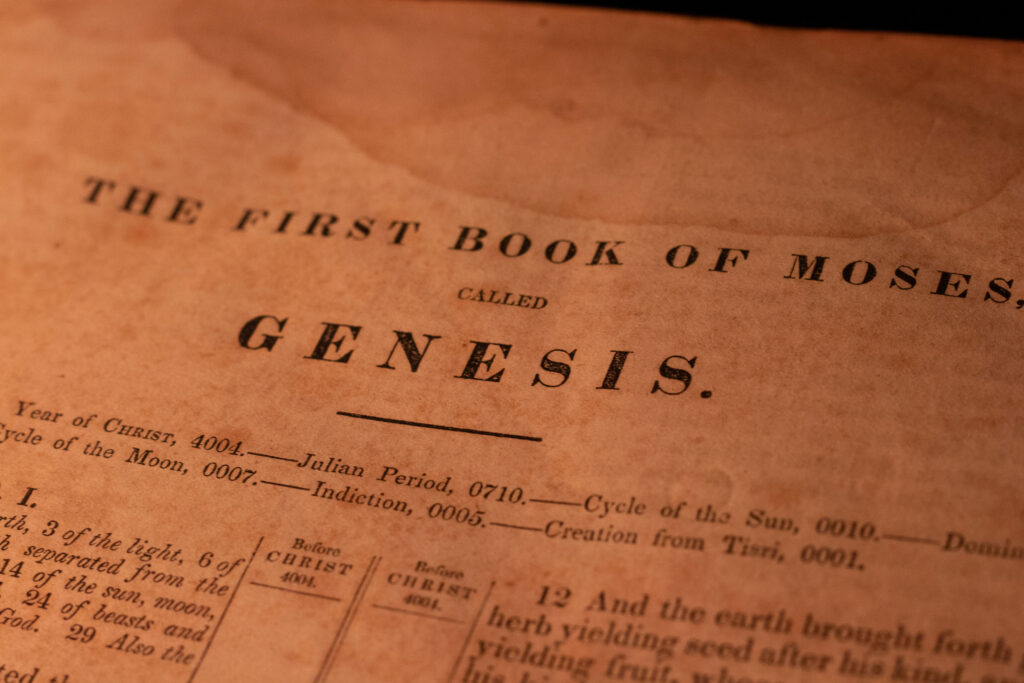Grace in the Eyes of the LORD
Hermeneutics teaches that a word’s meaning can be defined by examining the context of its first mention in Scripture. This is known as the “law of first mention.”
With that in mind, let’s look at the first time the Bible mentions GRACE.
We only have to travel a few pages into the Torah before we find God gifting man with the Hebrew word chen (חֵן), meaning “grace.” By reading Genesis 6:5-9 we can learn about how God set this word up to be defined throughout Scripture:
“The LORD saw that the wickedness of man was great in the earth, and that every intention of the thoughts of his heart was only evil continually… But Noah found grace in the eyes of the LORD… Noah was a righteous man, blameless in his generation. Noah walked with God.”
This opening book of God’s Word writes that mankind had become wicked and his intentions were evil continually. The fall in the Garden had led man to depravity as he engaged in things evil in God’s sight. But, there was one man in that corrupt generation who stood out — Noah.
Noah and the Ark
In a wicked generation, Noah walked with God and had right standing with Him. It also says Noah was blameless. The Hebrew word used here for blameless means “sound, wholesome, innocent, or having integrity.” Noah walked in integrity and innocence before the LORD. He was a light in the midst of darkness.
There are four verses that I’d like to put under a microscope:
“Then he sent forth a dove from him, to see if the waters had subsided from the face of the ground. But the dove found no place to set her foot, and she returned to him to the ark, for the waters were still on the face of the whole earth. So, he put out his hand and took her and brought her into the ark with him.
He waited another seven days, and again he sent forth the dove out of the ark. And the dove came back to him in the evening, and behold, in her mouth was a freshly torn olive leaf. So, Noah knew that the waters had subsided from the earth. Then he waited another seven days and sent forth the dove, and she did not return to him anymore.” (Genesis 8:8-12)
If we look at this passage and understand the symbolism in place, we see not only Yeshua. It includes also a synopsis of the Holy Spirit’s interaction with the Earth.
Now, what are the symbols?
Noah, the Dove and the Olive Branch
Let’s start with the dove. The dove typifies the Holy Spirit. We read about the Holy Spirit descending on Yeshua like a dove in the Gospels as well as all throughout rabbinic literature. For thousands of years, rabbis have written of the nature of the Holy Spirit being like a dove. Next, we’ll look at Noah.
In this passage, Noah is high upon a mountain, uses seven days as a timeframe/cycle, and he sends out the dove. He is a picture of the LORD, as the LORD resides in Heaven, created the Earth in seven days, and sent out the Holy Spirit.
Thirdly, let’s talk about the olive branch. Olive leaves are known to be bitter. They are not a symbol of sweetness or pleasantness, but of bitterness and animosity. What’s more is that Scripture tells us that the olive leaf is “freshly torn.” This word in Hebrew is taraph and is defined meaning “to tear, rend, or pluck.”
Therefore, in this story we have a picture of a leaf (Yeshua), which is familiar with bitterness and animosity, being torn and taken by the dove (Holy Spirit) to Noah (the Father).
The Prophetic Connection
It’s worth noting that the dove was sent out three times. If we look through the entire Bible, the Holy Spirit descends on man three major times in parallel. The first time is with Adam and Eve in the garden. Yet, because of their sin, the Holy Spirit, according to rabbinic literature and Christian commentaries, was said to have left them. Thus, the Holy Spirit went out for a little while but came back to the Father.
Just like the dove did the first time it was sent out.
The Holy Spirit descends a second time on Messiah Yeshua at His baptism. When Yeshua died, the Holy Spirit went back to the Father with Messiah. This parallels the dove finding the olive leaf and going back to Noah with the leaf.
The third time the Holy Spirit descended was when it fell on Pentecost in Acts 2. There the Holy Spirit remained on the people and has not gone back to the Father (because He now lives in us), just as the dove, on its third flight, did not return back to Noah. It doesn’t get much clearer than that.
Definition of Grace
The most common definition I hear of grace is “unearned, unmerited favor.” Is this what we see with Noah? Unearned and unmerited constitutes that actions count for nothing when grace is considered. Did Noah’s actions count for anything as he received grace?
I’m not sure if he “earned” the grace of the LORD… But it seems like his three actions of being righteous, blameless, and walking with God did have an impact on God’s decision to gift Noah with grace.
The only man to receive grace in the eyes of the Lord at the time was the man with these three attributes. So, does this mean that in order to find grace in the eyes of the Lord we each must be righteous, blameless, and walk with God?
Well… not quite.
Grace over Noah and the Family of God
Let’s take a look at one more verse in the story:
“But I will establish my covenant with you, and you shall come into the ark, you, your sons, your wife, and your sons’ wives with you.” – Genesis 6:18
I think this is the best verse out of the entire story of Noah. Why? Because this is where I fit in. And probably you as well.
All my life I read this story thinking I needed to be like Noah, blameless and perfect before God. But the reality is that I can’t. I fall short — often. But (and this is a very important “but”) I am part of the family.
You see, each of us fit in with one of three verses in Genesis 6. Verse 5 with the wicked, verse 8 with the blameless man, or verse 18 with the family of the blameless man.
Noah, the Ark and Jesus
For believers, the story of Noah points to Jesus (Yeshua) through and through. Because of the righteousness of one man, Noah, his whole family received grace in place of judgment. Through Yeshua, we, as part of His family, also receive grace in place of judgment.
“For the grace of God has appeared [through Jesus], bringing salvation for all people.” – Titus 2:11
Lastly, we see something beautiful in the spelling of Noah’s name in Hebrew. It is spelled identically with the Hebrew word for grace — only backward. Noah is a mirror, a reflection of grace. Just as Noah reflected the grace from God to his family, Yeshua reflects the grace from the Father to each of us who have been adopted into His family.
So, what is a good, Biblical definition for grace in light of the “law of first mention?” That’s for the scholars to figure out, but I think the following may not be too far off.
Grace (n.) — a gift of favor that comes through good relationship with someone, and which can be reflected to others by the one who receives it.

God’s Perfect Plan – From Israel to You: Free PDF Download
The Bible is full of God’s promises that can encourage our faith. Together, these promises make up one master plan of God.
You’re about to discover God’s perfect plan through the lens of 25+ references throughout Scripture.
Articles Related to Noah and the Ark
Estimated reading time: 7 minutes


